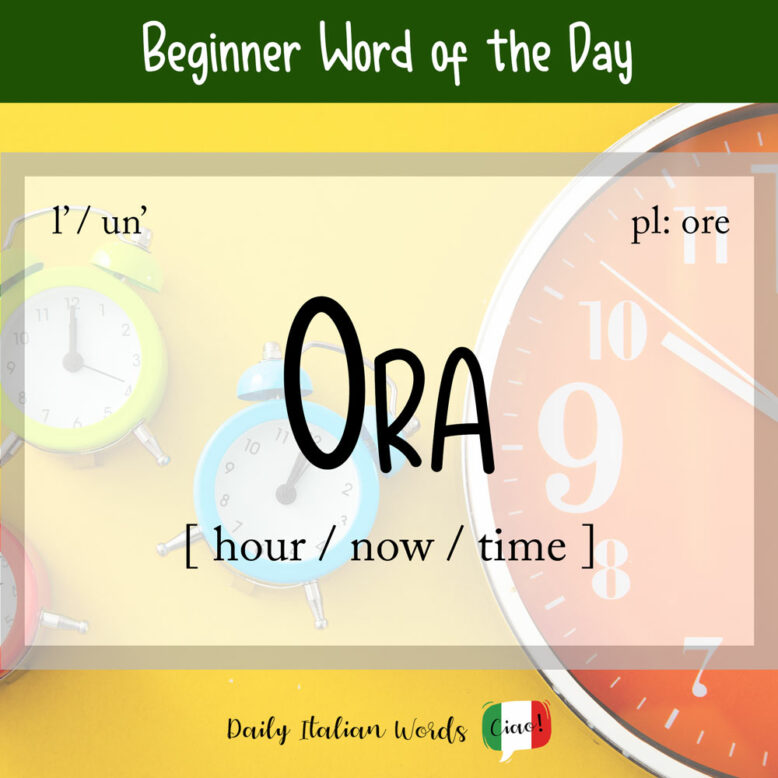If you learn one Italian word related to time today, make sure it is ora (feminine, plural: ore)!

One of the most common translations of this word is hour, as in the time unit of 60 minutes measured by the clock.
Questa lezione d’Italiano dura quasi un’ora.
This Italian lesson lasts almost an hour.
A half an hour is una mezz’ora and a quarter of an hour is un quarto d’ora.

An equally common translation is time, used when it is time to do something or for something to happen.
È già ora di tornare a casa?
Is it already time to go home?
It also appears in the expressions Che ora è? (Lit: What hour is it?) and Che ore sono? (lit: What hours are they?), both of which mean What time is it?
Che ora è? / Che ore sono?
What time is it?
A final translation is now or nowadays. Whether you use ora or its synonym adesso is mostly a question of personal preference.
Ora devo cominciare a preparare la cena.
Now I have to start making dinner.
Are you feeling excited about an upcoming holiday? Or perhaps your best friend is coming to visit from far away? If so, you can use the very common phrase Non vedo l’ora! which is the equivalent of the English expressions I can’t wait! or I’m looking forward to…! Literally translated, it means I don’t see the hour.
Non vedo l’ora che arrivi l’estate!
I can’t wait for summer!

Now that we’ve covered the various possible meanings for ora, let’s take a look at a few expressions that you may find useful when talking about the time in Italian.
- A che ora…? = At what time…?
- Per ora = For now
- D’ora in poi = From now on
- Ora o mai più = Now or never
- Era ora! = It’s about time!
- Fin’ora = Up until now
- Ora come non mai = Now more than ever
- Ora come ora = Right now
- Fare le ore piccole = to stay up until late
- Notizie dell’ultim’ora = latest news
Ora also forms the basis of two essential adverbs in Italian: allora (at that time, so, then) and or(a)mai (at this point, by now, already). The former comes from the Latin ad illam horam meaning a quell’ora whereas the latter is the union of ora and mai (never/ever).
Allora cosa facciamo stasera?
So what shall we do tonight?
Ormai è inutile tornare indietro.
At this point it’s useless to turn back.
Heather Broster is a graduate with honours in linguistics from the University of Western Ontario. She is an aspiring polyglot, proficient in English and Italian, as well as Japanese, Welsh, and French to varying degrees of fluency. Originally from Toronto, Heather has resided in various countries, notably Italy for a period of six years. Her primary focus lies in the fields of language acquisition, education, and bilingual instruction.


